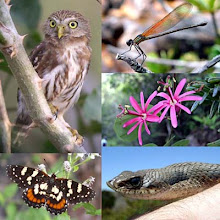Even though
I’m nearing the end of my six weeks of “vacation” in West Africa (Ghana, Togo,
and Benin), and have lots of great photos to share, I’m going to catch up on
some photos from my Northern Peru tour last month.
One of the
most striking changes in South American birding in the past decade has been the
appearance of hummingbird feeders. Northern Peru is no exception, and we took
advantage of three feeding stations that have been operational for about the
past five years only and were surprised by the addition of two more within the
past year. This allowed us to tally 41 species in just 9 days, an unthinkable
total just a few years ago.
One of the
new sites was a short drive from our first night’s city of Tarapoto. The star
hummer here was Koepcke’s Hermit, a Peruvian endemic that occurs nearly
throughout the length of the country, but only spottily in low-elevation
foothills at the outermost fringes of the Andes. In this area, one could only
hope for a quick glimpse at a stand of Heliconia
flowers before these feeders came to be.
Another
good one at these feeders was this Gould’s Jewelfront. Interestingly, the only
other feeders in the world I know of that host either of these same two species
also host both of them, at Amazonia Lodge in southeastern Peru, hundreds of
miles away. (It remains to be seen if the new lodge at Villa Carmen nearby will
also have them.)
The feeders
here were simply amazing. White-necked Jacobins, now regarded as one of the
most primitive of hummingbirds, were in all sorts of plumages, this one an
adult. (Some females look just like males, so I'm guessing one can't tell the sex on this one.)
It’s so cool
to see hermits come to feeders, and one of the prizes at Waqanki is this
furtive Black-throated Hermit – always at the feeders hanging low in the dark
shadows.
We were just
high enough in the foothills here for Sparkling Violetear and low enough for
Golden-tailed Sapphire.
The rarest
one was this Many-spotted Hummingbird, which came in only 2 or 3 times briefly.
They are usually a bit higher in elevation than this (where there are no
hummingbird feeders...yet).
One of the
best birds here is always Rufous-crested Coquette, with several birds present
at the feeders and in the Porterweed (Stachytarpheta)
hedges.
In addition
to the 15 species we saw at the feeders, three came only to flowers: A male
Little Woodstar (very rare this side of the Andes), several Blue-tailed
Emeralds, and a scarce Violet-headed Hummingbird. The only species we missed
that had been reported recently was a Rufous-throated Sapphire.
















No comments:
Post a Comment